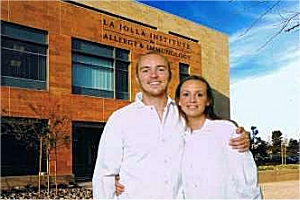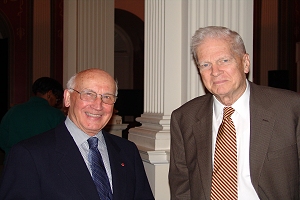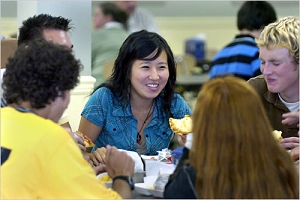Vice Versa
Focus on:online language skills

An online language skills program is bringing together American and Palestinian secondary school students. In the program, young Palestinians from the West Bank are creating online videos to help American students learn Arabic in their local schools.
The language videos are part of a program implemented by Relief International’s Schools Online (RI-SOL) to help young people bridge social and cultural divides through language study.
Palestinian students are so excited by the project that they spend extra time thinking up vocabulary lists and trying to find new creative ways to teach their American counterparts, says Anna Mussman from the State Department’s Bureau of Educational and Cultural Affairs. The bureau sponsors the Global Connections and Exchange Program, which RI-SOL implements by establishing Internet learning centers (ILCs) in countries across the world.
Several ILCs have been established throughout the West Bank -- in Jenin, Hebron, Nablus, Bethlehem and Ramallah. Collaborative projects are important learning tools of the program, and Palestinian students have created PowerPoint presentations on local agriculture and then organized tree plantings; studied English; and participated in online discussion forums with other students around the world. (See "Computer Center Builds Skills, Networks for Palestinian Youth.")
The program also benefits Palestinian teachers who learn new applications and teaching tools. Some have come to the United States for training. In addition, the program aims to empower women by teaching computer skills for civic engagement.
The new Arabic-language exchange connects Palestinian students with their Arabic-learning American contemporaries. Many of the American students are Utah residents, though students from other locales -- including Washington -- also participate.
As Palestinian students try to come up with creative and fun ways of using video technology, youngsters in both countries are learning about each other’s cultures and living conditions.
In December 2007 and January 2008, the American students asked the Palestinian students questions about the United States and if they would like to visit in the future, according to the RI-SOL Web site. The Americans also gave brief introductions and asked about music, television programs and sports teams. In January, six new reply videos were posted by Palestinian students from Jenin and Ramallah.
Arabic-language classes, once found only at the college level, are becoming increasingly available in U.S. secondary schools. In Utah, six schools in Salt Lake City, as well as schools in Provo and Lone Peak, have added Arabic to their curriculum.
In 2007, Brigham Young University in Provo, Utah, was the site of an intensive summer language camp for American high schools students and teachers in Arabic and Chinese. The camp, one of several funded by the federal government as part of President Bushs initiative to increase foreign language expertise, attracted some of the students in the Palestinian language exchange program.
More information about the Global Connections and Exchange Program (GCEP) in the Palestinian Territories is available on the Web site of Relief International’s Schools Online, including links to videos posted by Palestinian students. Also see the State Department’s Web page on GCEP.
Recently on Vice Versa
Mijn werk in San Diego: focus op diabetes.
 Ken Coppieters is a Belgian scientist working at The La Jolla Institute for Allergy and Immunology and lives with his wife Helena in San Diego, California. He is a regular contributor to this web site. In this article he focuses on his job at The La Jolla Institute in San Diego.
Ken Coppieters is a Belgian scientist working at The La Jolla Institute for Allergy and Immunology and lives with his wife Helena in San Diego, California. He is a regular contributor to this web site. In this article he focuses on his job at The La Jolla Institute in San Diego.
English (via Google)
Toen ik in 2002 in Gent afstudeerde als biotechnoloog, kreeg ik de kans om in het labo van Prof. Dirk Elewaut te gaan werken, een jonge reumatoloog die toen net 5 jaar post-doctoraal onderzoek achter de rug had in, jawel, San Diego. Ik droomde er sinds mijn eerste bezoek aan de V.S. al van om er ooit voor langere tijd te kunnen leven en werken, en toen ik Dirk hoorde vertellen over zijn verblijf aan The La Jolla Institute for Allergy and Immunology was ik dan ook snel overtuigd om de stap te zetten, en koos voor hetzelfde instituut.
Herman Van der Wee says globalization occurs in waves
 One of the world's foremost economic historians, Herman Van der Wee of Belgium, says that globalization is a new word for an old process that has been going on for centuries.
One of the world's foremost economic historians, Herman Van der Wee of Belgium, says that globalization is a new word for an old process that has been going on for centuries.
U.S. Student Visas Reach Record Numbers in 2007
 In 2007, the Department of State issued a record number of student and exchange visitor visas -- more than 600,000 -- greater than 10 percent more than last year. The numbers are proof of the success of the U.S. government’s effort to reverse the drop in student and other visa applications after the terrorist attacks of September 11, 2001, U.S. Assistant Secretary of State for Consular Affairs Maura Harty told USINFO.
In 2007, the Department of State issued a record number of student and exchange visitor visas -- more than 600,000 -- greater than 10 percent more than last year. The numbers are proof of the success of the U.S. government’s effort to reverse the drop in student and other visa applications after the terrorist attacks of September 11, 2001, U.S. Assistant Secretary of State for Consular Affairs Maura Harty told USINFO.